Holly Moscrop – Back British Farming blog
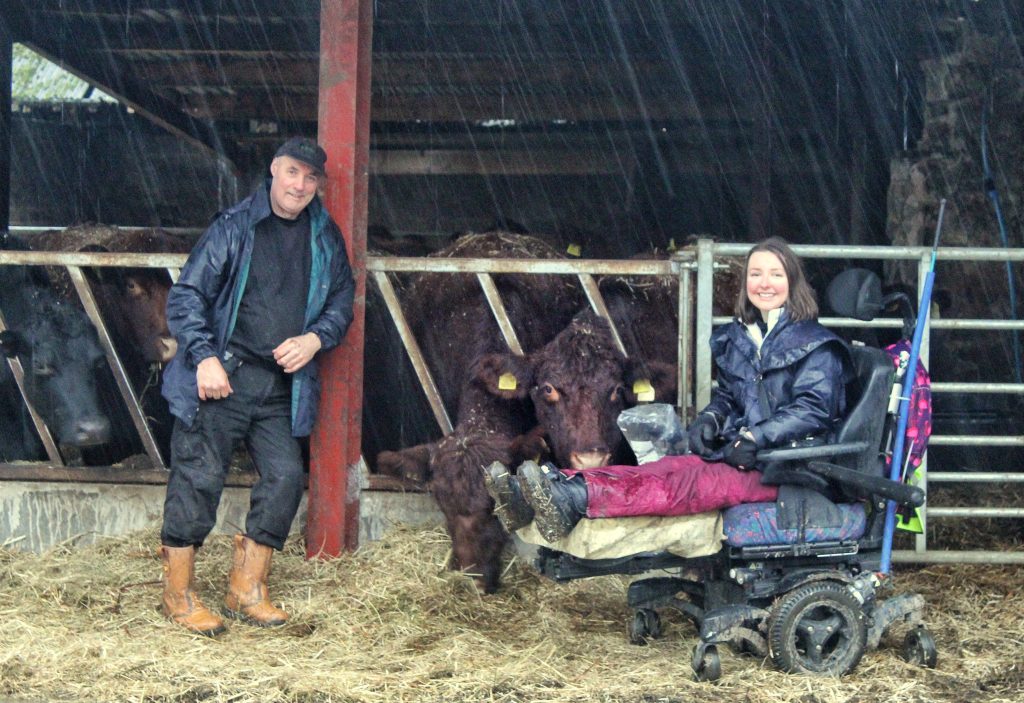
As part of our campaign to Back British Farming we sit down with farmers on our rural community blog, and chat about all things farming. In this blog we spoke with Holly Moscrop (@onegirlandhercows), a cattle farmer from Yorkshire. Read more below about her journey and life in farming…
Hello there! I’m Holly, a cow-loving, Yorkshire lass, and the Girl behind the blog, One Girl and Her Cows, where I try and give an insight into the world of Agriculture and help people reconnect to their food, as well as bringing the British Countryside to those who perhaps don’t have the same view out of their bedroom window.
I was lucky enough to grow up on the beautiful farm I still get to call my home, tucked away on the edge of Leeds in West Yorkshire. My grandfather originally took the farm on in the early 60s; he was what nowadays we would call a new entrant. My Granny joined him shortly after, to farm alongside him and help mould it into a mixed farm, with livestock for her to tend to, like the one she’d grown up on, and we’ve been here ever since.
I can’t remember when exactly I decided I wanted to be a farmer, it was just something ingrained deep within me. Growing up on a farm, you’d be hard-pressed not to catch a bit of the farming bug, but I always knew there was no place else for me.
I’ve been an animal person from the start. My childhood was shaped by the many horses, dogs, cats, pigs, sheep and cows who entered it, and is filled with memories of watching calves and lambs being born and spending hours bouncing along in the tractor cab next to my dad.
I loved helping out around the farm, especially with the little flock of sheep we used to have. Like all children, I loved bottle-feeding any lambs who needed it; however, unlike most children, I watched in awe whilst making mental notes, as my Granny demonstrated how to skin a dead lamb and tie the skin onto the foster lamb, so the ewe was less likely to notice the difference and would mother the replacement without any qualms. Everything fascinated me.
However, as I turned 16, I developed some chronic health conditions which knocked me off my planned-out path of Agricultural College and becoming a farmer in the way I had imagined. I spent a lot of years only able to experience our farm through a window or a screen, and once I was well enough to, had to find a different way of being a part of it.
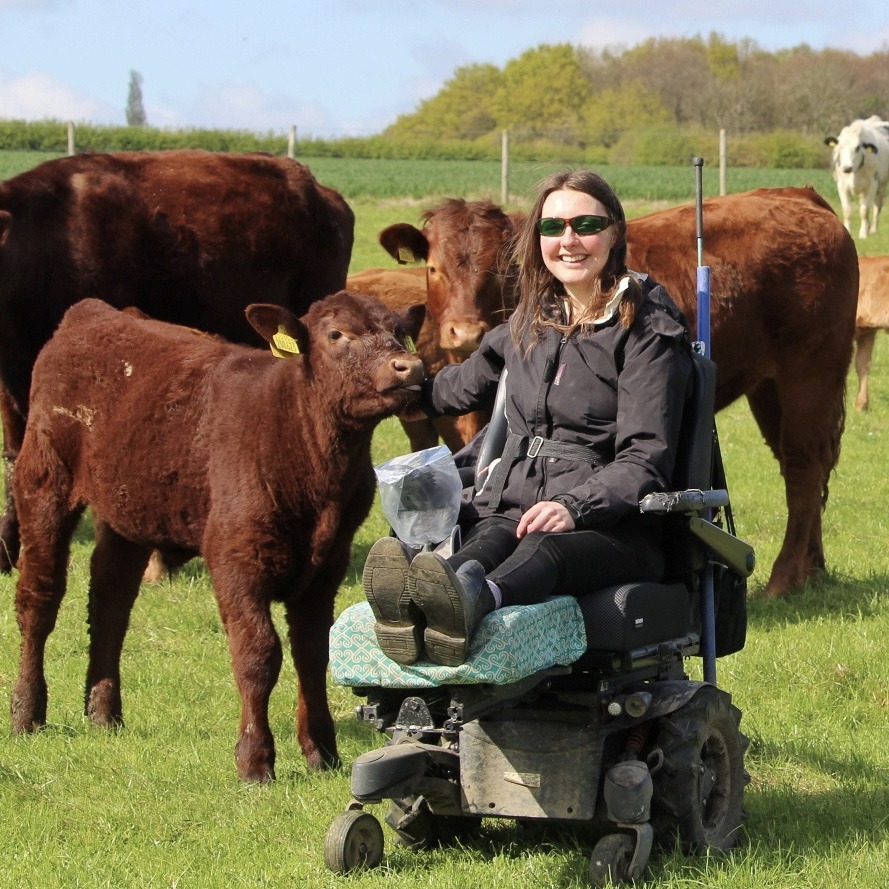
There’s been a lot of adapting and thinking outside of the box over the years, especially during the years where I couldn’t leave my bedroom at all. We basically had to bring the farm to me, so my dad set cameras up in the cow shed so I could always see what was going on and watch for any calving problems.
Nowadays, alongside ‘maternity watch’ each spring, I’m also in charge of all the paperwork that comes with running our mixed beef and arable farm and agricultural contracting business. It’s my way of being a part of the industry I love while also being able to take care of my health and be flexible with when and where I work from (usually my bedroom). I’m so grateful that farming has so many different roles within the industry other than physically being a farmer, which means I’m still able to play a part in the story behind the food on our plates.
When my health allows, I also love helping out with our cows; they’re where my heart will always lie. You’ll often find me outside in my powered wheelchair, which my dad has ‘farm-proofed’ with some tyres with tractor tread, helping move cows or herd-up wayward calves throughout the summer, checking the latest arrival in the calving shed in spring, or watching one arrive, on hand to break the birth sac if necessary to make sure the calf doesn’t suffocate, or sitting by the cattle crush helping with routine management tasks like vaccinating or weighing when the cattle come inside for winter.
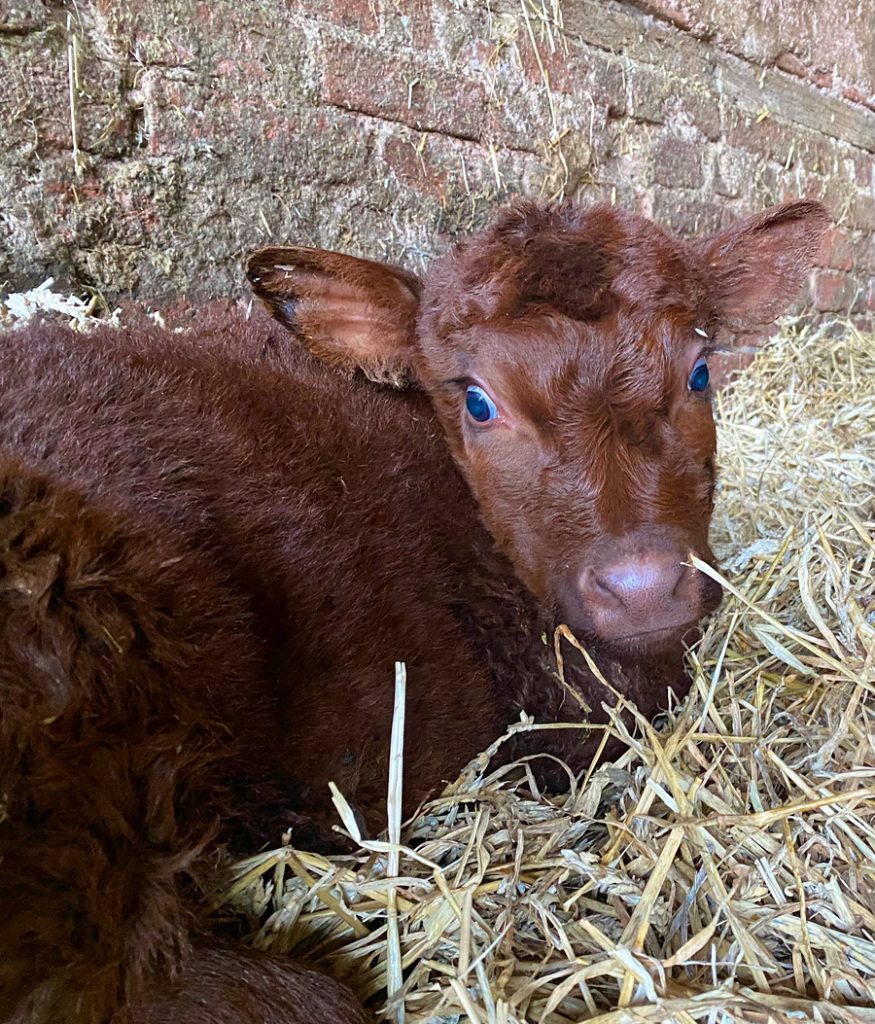
Me being able to work with them is one of the reasons why we chose our breed of cows. Most of them are a large, deep red, maternal beef breed which is native to the UK, called Lincoln Reds. We began to keep them after deciding to try and make life easier, and safer, so one day, I could work with them too.
Their easy-going, gentle temperament was one of the main traits we were looking for (dad’s knees don’t really like scaling gates at speed anymore and I’m not exactly your average fit-as-a-fiddle farmer, so we needed a change from some of our previous pretty wild and feisty cows!), and as I did my research, I found they ticked all our other boxes too, three of them being: milky, so they can rear a good sized calf on just grass and milk, easy calving, and polled, which means their calves don’t need dehorning which saves us a job! We bought 8 heifers in 2015 as a trial and have continued to buy more from the same place ever since, and now begun to breed our own.
Our bull, Basil, is a French breed, called a Bazadaise. He’s quite a striking sight with a silver-grey body, turning to black on his shoulders and rump. The Bazadaise’s a breed with lots of shape and muscle, which only develops once the calf is born. Together, the two breeds produced some lovely, well-shaped calves who grow well on their mothers’ rich milk.
Our herd is a suckler herd, which means our cows are beef cows who all have a calf each year and rear that calf on their milk. Their calves are weaned from them at around 9 months old, then sold at a year old to other farms in the area, to be later finished for beef.
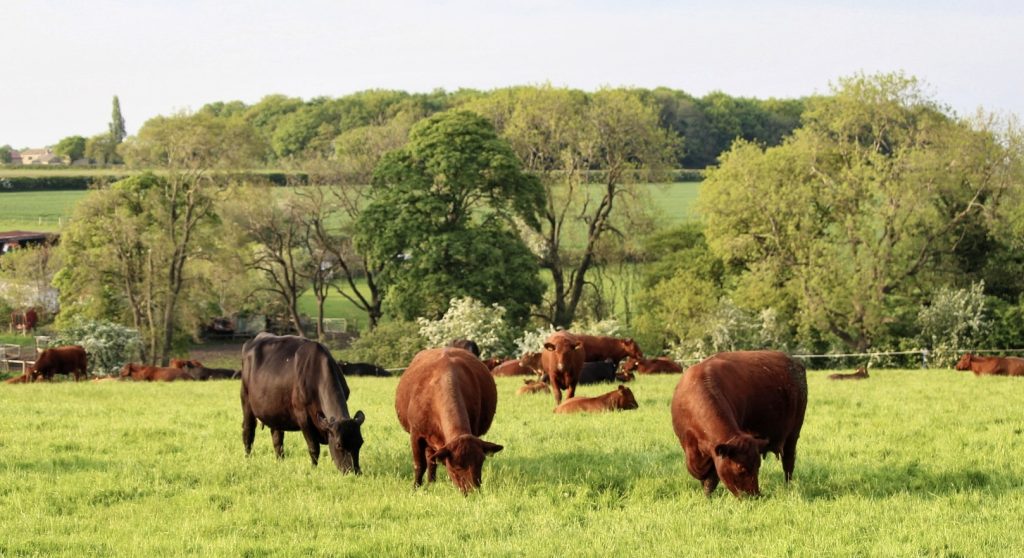
With farming and working so closely with Mother Nature you get some epic highs and also some crushing lows, you have to be ready to adapt to whatever situation is thrown your way, and hold on tight to the moments that give you that buzz of joy so they can carry you through the tough times.
The highs for me will always be getting a front row seat to the magical sight of new life coming into the world. A calf taking its first breath and first wobbly steps, with its mother mooing softly to it, will never get old. But of course, Mother Nature can sometimes be as cruel as she is beautiful. Trying and failing to save the life of an animal is always heart-breaking, and knowing that ultimately, we can’t always control outcome, no matter how hard we try, can be a hard pill to swallow. The losses always stay with you, and you have to learn how to carry the grief while you focus your energy on all the other animals that are still counting on you. Luckily, there’s always something else going on and the variety each day brings helps you move on from the difficult moments.
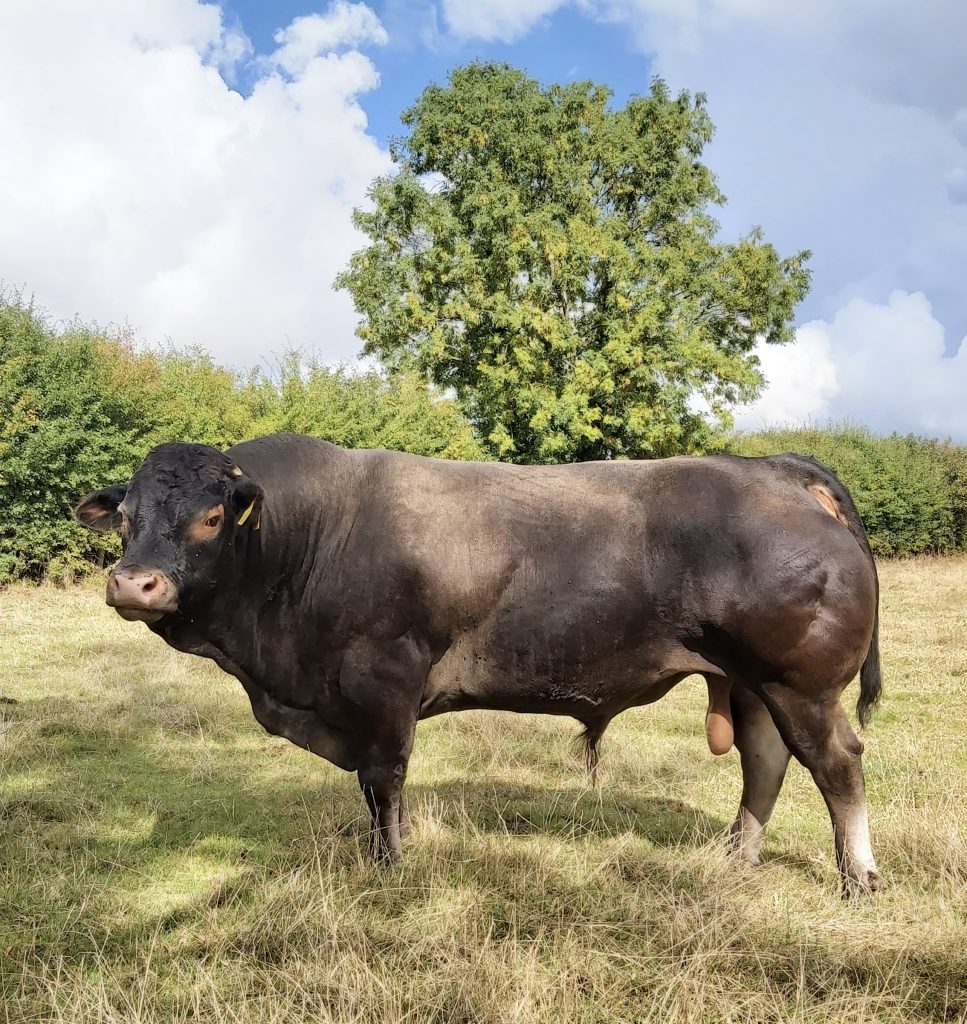
It’s often assumed that farmers just sit on a tractor all day, but there’s much more to the job than your driving skills (or like me, lack of!). Although I’m not able to work in the industry as I’d intended to, I love the fact that as there are so many components which go into being a farmer, we are able to adapt roles to suit my disability.
One of my biggest wishes is that more people knew how many different jobs there are within agriculture, all of them playing a vital role in getting the food onto our plates. From vets, to scientists, to machinery mechanics, to journalists, and tonnes more, there’s so much more than just being a farmer, and new ideas and perspectives are always needed.
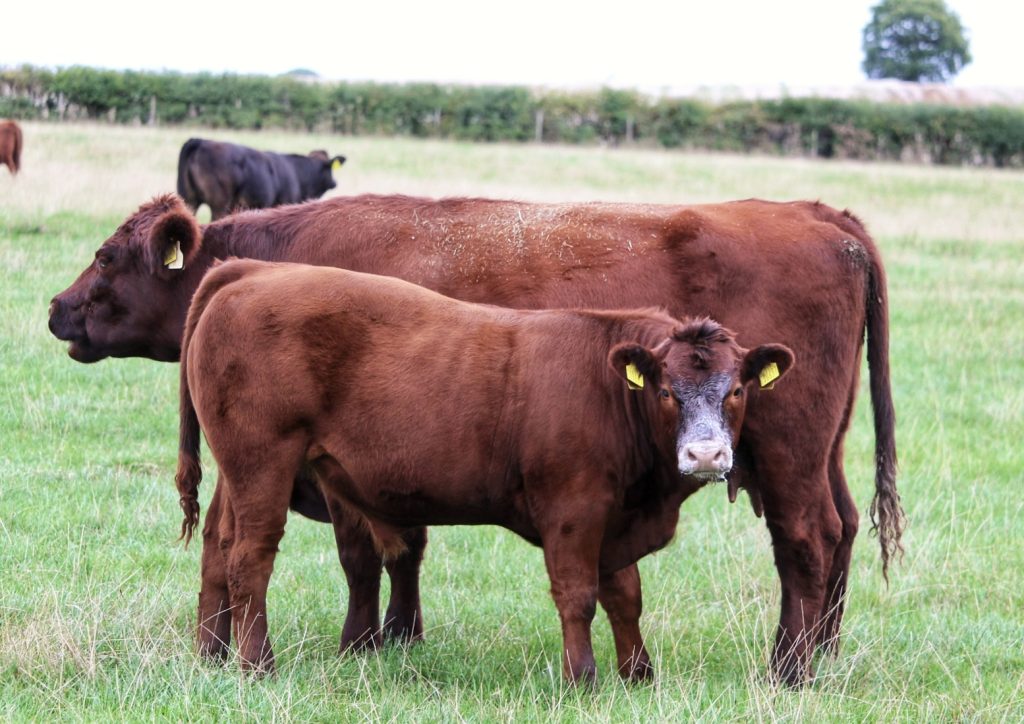
As an industry, we’re definitely not going to win any prizes for our diversity, and there’s lots of people in society who don’t see themselves represented here and are put off, or actively discouraged, from joining us. But there’s some of us working really hard to make sure one day, every child will see themselves reflected back in the farming industry so they can grow up knowing that if they have a passion for agriculture, there’s a place for them here, whatever their background, race, sexual orientation, disability, gender or lack of connection to farming.
I know how immensely lucky I’ve been to have had a childhood interlaced with farming, and family and friends who have never been anything but supportive, and to have had the support to join the industry after becoming disabled, and I’d love nothing more than to encourage others to give somebody else that support as well. There are plenty of people who want to join us, and it’s up to us to give them the support they need.
If you’re a farmer and you’d like to contribute in our campaign to raise awareness for the incredible work in British agriculture, please drop us a DM on Instagram – @aplanrural







